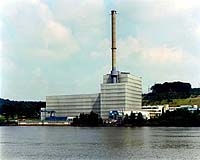 |
Paris (AFP) July 9, 2009 Tension is shaping up over pressure from EDF, the world's biggest nuclear power producer, for a price leap for French households amidst big developments in France's vital nuclear power industry. The group's chief executive Pierre Gadonneix revealed in a magazine interview on Wednesday that EDF was seeking permission from the government to raise the price of household electricity by 20 percent over three years, or slightly longer, so that the group could stop going deeper into debt. He backed this up with comments on Thursday, but Economy Minister Christine Lagarde shot back that the government was "absolutely not tied by the points put forward" by EDF. She said ministers would examine the request in due course and take decisions. But she observed: "When one wants the stars one reaches even higher for the moon." EDF, which recently made a massive investment to buy most of Britain's nuclear power capacity now due for renewal, also revealed on Wednesday that it had just raised 3.2 billion euros (4.45 billion dollars) from a bond issue to ordinary savers. This was three times more than it had expected to raise for its investment programme. Gadonneix said in an interview with RTL radio on Thursday that the request for an increase in the regulated price of French electricity would amount to an additional "two to three euros per month" on household bills if it were spread over three to four years. "This is not a matter of asking for a price rise tomorrow," he said "but of an increase spread out over time." He said that "electricity in France is 30-40 percent cheaper than in other European countries," and that in the last 25 years the rise of electricity prices in France had never been greater than inflation. EDF needed to catch up, therefore. "We cannot increase directly investment in France as we are doing if we don't also increase sales revenues." EDF had to catch up on prices so that "EDF's success can be secured" otherwise "in ten years' time all of the success of the nuclear industry will be behind us." He expected the government to respond with a long-term process for prices to catch up. Electricite de France (EDF) is about 85-percent owned by the French state and has expanded elsewhere in Europe as energy markets have been opened up. It generates about 80 percent of electricity used in France from nuclear power stations, and exports energy via European transmission networks, but at hours of peak consumption it sometimes has to import electricity. France is the biggest generator of nuclear energy in the world, and also has a world leader in the construction of nuclear generating plants, called Areva. This nuclear power base is widely considered to be a jewel in the French industrial crown. In January, EDF bought privatised British Energy, including the British government's remaining 35.2-percent stake, for 15.6 billion euros. British Energy operates eight of 10 nuclear power plants, due for replacement, in Britain, and the deal was seen as part of a drive by France to strengthen its position in the international market for nuclear power, which is widely expected to grow. Under a complex deal in May, EDF teamed up with British group Centrica, which paid 2.3 billion pounds (2.66 billion euros) for 20 percent of the British operation, while selling its Belgian energy interests to EDF for 1.3 billion euros. Meanwhile, France is working on strengthening the finances of its industrial nuclear group, Areva, saying on June 30 that it was going to raise new capital by offering up to 15 percent of the company to strategic and industrial partners. The operation seems likely to reduce the state's interest in Areva from 90 percent to about 78 percent. Areva needs 8.0-10 billion euros by 2012 to fund investment and notably its third generation EPR nuclear reactor. It is also estimated to need a further 2.0 billion euros to buy out a stake owned by German group Siemens in a joint subsidiary. These changes are taking place against a background of strains for French public finances which have been severely aggravated by the global economic crisis, and President Nicolas Sarkozy has launched a plan for a national loan to be devoted to investment for development. Share This Article With Planet Earth
Related Links Nuclear Power News - Nuclear Science, Nuclear Technology Powering The World in the 21st Century at Energy-Daily.com
 More problems at aging German nuclear plant: operator
More problems at aging German nuclear plant: operatorBerlin (AFP) July 9, 2009 The Swedish operator of the aging German nuclear power station Kruemmel revealed on Thursday more problems at the plant, which has been shut down for emergency repairs since the weekend. All 80,000 fuel rods at the plant near Hamburg will be examined from Friday because "it looks as if one or several of the rods in the reactor is defective," said Ernst Michael Zuefle, head of operator ... read more |
|
| The content herein, unless otherwise known to be public domain, are Copyright 1995-2009 - SpaceDaily. AFP and UPI Wire Stories are copyright Agence France-Presse and United Press International. ESA Portal Reports are copyright European Space Agency. All NASA sourced material is public domain. Additional copyrights may apply in whole or part to other bona fide parties. Advertising does not imply endorsement,agreement or approval of any opinions, statements or information provided by SpaceDaily on any Web page published or hosted by SpaceDaily. Privacy Statement |